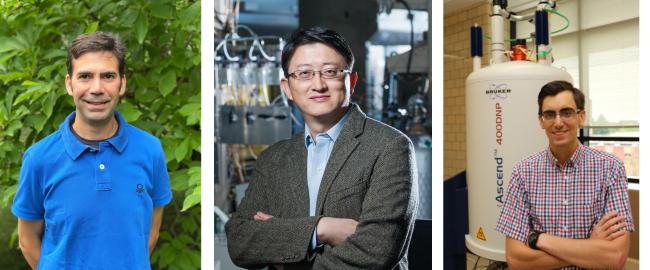Plastic waste is everywhere in the United States, rapidly piling up in our landfills, leaching into and clogging our waterways. Yet the nearly 27 million tons generated in the US in 2017 (EPA) is full of energy and carbon value, which is currently lost.
The global accumulation of plastic waste creates energy, environmental, and human health concerns. Now a multi-institutional team of scientists led by the U.S. Department of Energy’s Ames Laboratory, which has been working on the problem for almost three years, is growing into the Institute for Cooperative Upcycling of Plastics (iCOUP) Energy Frontier Research Center (EFRC), with $12.8 million in funding over four years. Announced July 1 by Energy Secretary Dan Brouillette, the DOE’s EFRC program is designed to bring together multi-disciplinary teams of scientists to take on some of the defining energy challenges of the 21st Century— in this case, plastic waste upcycling.

“We’re very excited to have the support of the DOE to pursue the discovery of new concepts that will enable plastic upcycling. The multi-disciplinary collaborations that are part of an EFRC are key to addressing fundamental scientific challenges in plastic upcycling,” said Aaron Sadow, Director of iCOUP. Sadow is a scientist in the Division of Chemical and Biological Sciences at Ames Laboratory, as well as a professor of Chemistry at Iowa State University.
iCOUP consists of researchers at Ames Laboratory, Argonne National Laboratory, UC Santa Barbara, University of South Carolina, Cornell University, Northwestern University, and University of Illinois, Urbana-Champaign. The goal? To create catalysts that transform discarded single-use plastics into more valuable products, providing incentives to treat used plastics as a resource rather than as garbage.
“Plastics recycling has an economics problem,” said Sadow. “Currently available recycled plastics are commonly ‘downcycled,’ meaning they do not perform as well and are less valuable than the original plastic. As a result, current recycling methods are not equipped to address the plastic waste crisis.”

“We want to change the cycle by transforming the waste plastics into new, higher value products, rather than just recycling used plastics. That is the concept behind upcycling. Here is the science challenge: we need to break just some of the carbon-carbon bonds in the polymers of waste plastics. Finding a method to selectively “chop” long polymer chains into smaller pieces will transform them into upcycled products— providing new raw materials for the chemical industry to manufacture useful chemicals, such as lubricants, detergents, and fuels.”
While the group has already published key papers on the topic, the funding will allow them to pursue new methods for breaking carbon-carbon bonds in polymer chains and understanding those methods from physical, chemical, and materials perspectives.
Ames Laboratory is a U.S. Department of Energy Office of Science national laboratory operated by Iowa State University. Ames Laboratory creates innovative materials, technologies and energy solutions. We use our expertise, unique capabilities and interdisciplinary collaborations to solve global problems.
DOE’s Office of Science is the single largest supporter of basic research in the physical sciences in the United States, and is working to address some of the most pressing challenges of our time. For more information, please visit science.energy.gov.
Contacts:
Aaron Sadow, Division of Chemical and Biological Sciences, 515-294-8069
Laura Millsaps, Ames Laboratory Communications, 515-294-3474
###
